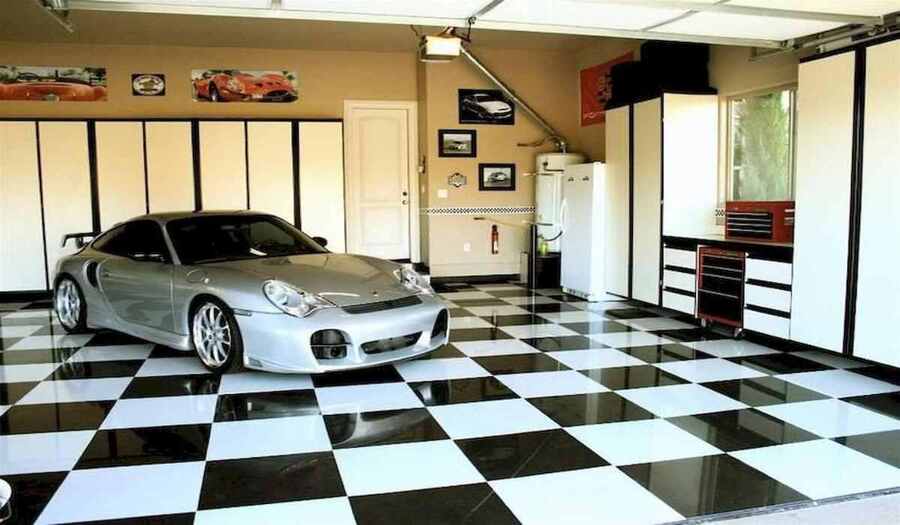In this article, we’ll explore three main types of garage floor tiles – interlocking tiles, flexible PVC tiles, and rigid plastic tiles. We’ll investigate their features, compare installation methods, and evaluate their suitability for various garage floor applications.
Interlocking Garage Floor Tiles
Interlocking garage floor tiles are favored for their versatility and straightforward installation. With the flexibility of fitting together like puzzle pieces, these tiles provide a seamless floor surface that can accommodate any garage size or shape.
Features
The primary appeal of interlocking tiles lies in their strength and durability. Made predominantly from heavy-duty plastic or vinyl, these tiles can resist pressure from heavy vehicles, tools, and equipment. The interlocking design ensures that the floor stays in place under stress, and the tiles are often textured to provide additional grip and slip resistance.
Moreover, interlocking tiles come in a wide range of colors and patterns, providing homeowners with customization options to match their personal style or the aesthetics of their garage. They also have efficient drainage systems with channels underneath to keep the floor dry and clean.
Installation
Interlocking garage floor tiles don’t require any special tools or adhesives for installation. The process is as simple as aligning the tiles and locking them into place, and homeowners can easily do it themselves. While cutting may be necessary to fit the corners and edges of the garage, it is generally straightforward, requiring only a utility knife.
Suitability
Due to their strength and durability, interlocking garage floor tiles are suitable for various applications, including commercial garages, home garages, workshops, and showrooms. Their resistance to oil, grease, and other chemicals makes them an excellent choice for mechanic shops.
Flexible PVC Garage Floor Tiles
Flexible PVC garage floor tiles offer a balance between comfort and durability. These tiles are flexible yet sturdy, providing a softer underfoot feel than their rigid counterparts, which can benefit garages used for long work hours.
Features
Flexible PVC tiles are resilient, waterproof, and resistant to most chemicals, making them an excellent option for garages. Their flexible nature enables them to withstand heavy impacts without cracking. Furthermore, these tiles are available in a variety of colors and patterns, allowing for numerous design possibilities.
Another advantage is their noise-reducing quality. Due to their softer material, these tiles can absorb sound better than other types of flooring, which contributes to a quieter working environment.
Installation
Like interlocking tiles, flexible PVC tiles can be easily installed. They typically utilize a hidden interlocking system that offers a seamless look once installed. However, flexible PVC tiles may require a rubber mallet for installation to ensure the interlocks are tightly engaged.
Suitability
Flexible PVC tiles are suitable for a wide range of applications, including residential, commercial, and industrial garages. They are ideal for garages that double as workshops where comfort and noise reduction are important.
Rigid Plastic Garage Floor Tiles
Rigid plastic garage floor tiles are a top choice for those seeking a hard, flat surface. These tiles offer superior strength and durability, capable of withstanding heavy loads and high traffic.
Features
Rigid plastic tiles are typically made from robust and hard-wearing polypropylene. These tiles are stain-resistant and can handle oil spills, chemicals, and heavy machinery without damage. They also feature a self-draining system, which aids in maintaining a clean and dry garage floor.
Like other tile options, rigid plastic tiles are available in various colors and patterns, offering significant customization options.
Installation
Rigid plastic tiles also employ an interlocking system, ensuring a secure and stable floor. Although they can be slightly harder to fit together due to their rigidity, no special tools or adhesives are required. A rubber mallet can help to fit the tiles together snugly.
Suitability
Rigid plastic tiles are an excellent choice for high-traffic areas and commercial garages due to their robust nature. They also work well in residential garages, especially where heavy vehicles or machinery are stored.
When choosing the proper garage floor tiles, consider the specific needs of your garage, including the type of vehicles or equipment stored, the chemical exposure level, the traffic frequency, and your personal aesthetic preferences.
Interlocking tiles offer versatility and strength, flexible PVC tiles provide comfort and noise reduction, while rigid plastic tiles offer robust durability. Regardless of your choice, garage floor tiles can transform your garage into a functional and aesthetically pleasing space.
Key Takeaways:
- Garage floor tiles are popular for their durability, versatility, and easy installation, among other benefits.
- Interlocking garage floor tiles are robust and versatile. They’re easy to install, provide good grip, and come with efficient drainage systems. These tiles are suitable for a wide range of applications, from residential garages to commercial workshops.
- Flexible PVC garage floor tiles offer a balance between comfort and durability. They are resilient, waterproof, and noise-absorbing. These tiles are ideal for garages that double as workshops or areas where comfort and noise reduction are priorities.
- Rigid plastic garage floor tiles provide a hard, flat surface with high strength and durability. They are stain-resistant and can handle heavy loads, making them a good choice for high-traffic areas and commercial garages.
- The choice of garage floor tiles depends on several factors, including the type of vehicles or equipment stored, the level of chemical exposure, traffic frequency, and personal aesthetic preferences.
- Regardless of the chosen type, garage floor tiles can enhance your garage’s functionality and aesthetics.


Recent Comments